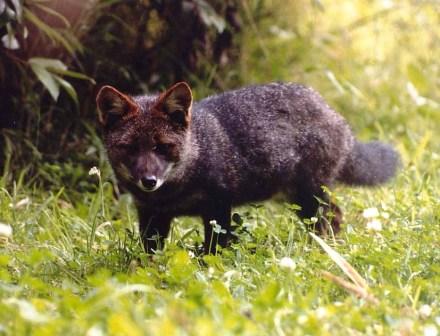|
| Query: fox | Result: 6th of 1530 | |
Darwin's Fox, Darwin's Zorro (Pseudalopex fulvipes) - Wiki
| Subject: | Darwin's Fox, Darwin's Zorro (Pseudalopex fulvipes) - Wiki
| |

| Resolution: 440x336
File Size: 29986 Bytes
Date: 2005:02:10 01:06:38
Upload Date: 2007:09:04 00:11:38
|
Darwin's Fox
From Wikipedia, the free encyclopedia
[Photo] English: A male Darwin's fox in western coast of Chiloe, Chile (Espa??ol: Macho de zorro chilote (Pseudalopex fulvipes) en Ahuenco, costa occidental de Chilo??, Chile. Mapudungun: Wentru payneng??r?? Chillwe Wapi ??i nag lafken mapu mew). Date febrero 2005. Author Fernando B??rquez
Darwin's Fox or Darwin's Zorro (Pseudalopex fulvipes) is a small endangered canine from the genus Pseudalopex. Darwin's Fox was first collected from Chilo?? Island off the coast of Chile by the naturalist Charles Darwin in 1834. It was long held that Darwin's Fox was a subspecies of the Grey zorro (P. griseus); however, the discovery of a small population of Darwin's Fox on the mainland in Nahuelbuta National Park in 1990 and subsequent genetic analysis has clarified the fox's status as a unique species.
Taxonomy and evolution
Pseudaloplex is a South American genus of canine distantly related to wolves and is technically not a fox. When Charles Darwin collected a specimen from Chilo?? Island, he observed that it was distinct from the species, P. culpaeus and P. griseus, that occur on the mainland. Darwin's Fox does not interbreed with the other Pseudalopex species, only lives in forests, and is smaller and darker-colored than the other species. It was not until a small population of Darwin's Fox was found on the mainland in the forested Nahuelbuta National Park and subsequent genetic analysis was performed, that the Darwin's Fox was confirmed as a distinct species.
In the late Pleistocene, Chilo?? Island was connected to mainland Chile by a land bridge. The land bridge was severed about 15,000 years ago when the sea level rose following the last glaciation. This created two isolated populations of Darwin's Fox.
Physical description
Darwin's fox has a dark brown coat with red areas on its head and face, and it has shorter legs than the mainland foxes, and weighs 2-4 kg, much smaller than the P. griseus which weighs between 5-10 kg.
Ecology
Darwin's fox is generally believed to be a forest obligate species found only in southern temperate rainforests. They only occur in forested areas on Chilo?? and on the mainland. The are most active at twilight and before sunrise.
Conservation status
It is believed that there are only 250 Darwin's foxes on Chilo?? Island and up to 70 on the mainland, and they are listed as critically endangered by the World Conservation Union. Fragmentation of forest adjacent to National Parks is a concern for their conservation and dogs in the Parks may be the greatest conservation threat in the form of potential vectors of disease or direct attack.
http://en.wikipedia.org/wiki/Darwin%27s_Fox
| The text in this page is based on the copyrighted Wikipedia article shown in above URL. It is used under the GNU Free Documentation License. You may redistribute it, verbatim or modified, providing that you comply with the terms of the GFDL. |
|
Comments |
|---|
| | Guest |
|
| Hey thanks for repeating exactly what wikipedia said! Thanks for being so original! |
| | Wiki Photos |
|
| Darwin's fox or Darwin's Zorro (Lycalopex fulvipes) is a small Endangered canine from the genus Lycalopex. |
| | Guest |
|
Scientific Name: Lycalopex fulvipes Martin, 1837
Common Names: Darwin's Fox; [Spanish] Zorro Azul, Zorro Chilote, Zorro de Chiloé, Zorro de Darwin
Synonyms:
Pseudalopex fulvipes (Martin, 1837)
Pseudalopex lagopus (Molina, 1782)
Vulpes fulvipes Martin, 1837 |
^o^
Animal Pictures Archive for smart phones
^o^
|
|
|

